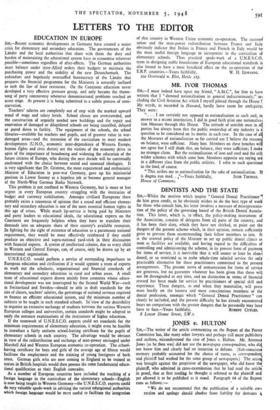LETTERS TO THE EDITOR
EDUCATION IN EUROPE
SIR,—Recent economic developments in Germany have created a major crisis for elementary and secondary education. The governments of the Lander and the local authorities that share with them the duty and burden of maintaining the educational system have to economise wherever possible—sometimes regardless of after-effects. The German authorities must balance under inter-Allied orders their budgets to maintain the purchasing power and the stability of the new Deutschemark. The redundant and hopelessly overstaffed bureaucracy of the Lander that prepares the financial programme for the Ministers is naturally inclined to seek the line of least resistance. On the Continent education never developed a very effective pressure group, and only became the theme- song of party controversy whenever denominational problems reached an acute stage. At present it is being submitted to a subtle process of semi- starvation.
Teachers' salaries are completely out of step with the marked upward trend of wage and salary levels. School classes are overcrowded, and the construction of urgently needed new buildings and the repair and renovation of damaged or dilapidated schools are being cancelled, delayed or pared down to futility. The equipment of the schools, the school libraries—available for teachers and pupils, and of greatest value in war- damaged areas—and the extension of the curriculum to meet modern developments (U.N.O., economic inter-dependence of Western Europe, human rights and civic duties) are the victims of the economy drive in spite of the importance of broadening and widening the education of the future citizens of Europe, who during the next decade will be continually confronted with the choice between sound and unsound ideologies. It is very significant that Dr. Grimme, the most experienced and enthusiastic Minister of Education in post-war Germany, gave up his ministerial position in Lower Saxony as a hopeless job to become general manager of the North-West German Radio Network.
This problem is not confined to Western Germany, but is more or less urgent in every European country struggling with the intricacies of budget and currency stabilisation. Amongst civilised Europeans there probably exists a consensus of opinion that a sound and efficient elemen- tary and secondary education is one of the most essential human rights in this age of crises. While much lip-service is being paid by Ministers and party leaders to educational ideals, the educational experts on the Continent are frequently helpless when they have to translate their demands into an adequate share of their country's available resources. In fighting for the right of existence of education as a paramount national requirement, they would be most effectively reinforced if they could produce an objective and supra-national yard-stick in their discussions with financial experts. A system of intellectual calories, due to every child in Western and Central Europe, can, of course, only be drawn up by an international organisation.
U.N.E.S.C.O. would perform a service of outstanding importance to European education and civilisation if it would appoint a team of experts to work out the scholastic, organisational and financial standards of elementary and secondary education in rural and urban areas. A small team of educational experts drawn mainly from countries whose educa- tional development was not interrupted by the Second World War—such as Switzerland and Sweden—should tie able to draft standards for the size of classes, teachers' salaries, the percentage of national revenue required to finance an efficient educational system, and the minimum number of subjects to be taught in such standard schools. In view of the desirability to organise an extensive exchange of students between the various Western European colleges and universities, certain standards might be adopted to unify the entrance examinations of the institutions of higher education.
If the teamwork of U.N.E.S.C.O. experts could set standards for the minimum requirements of elementary education, it might even be feasible to introduce a fairly uniform school-leaving certificate for the pupils of elementary schools in each country. The advantage would be obvious in view of the redistribution and exchange of man-power envisaged under Marshall Aid and Western European economic co-operation. The school- leaving certificate for boys and girls of the average age of fifteen would facilitate the employment and the training of young foreigners of both sexes. German girls who are now coming to England to be trained as nurses in British hospitals would then possess the same fundamental educa- tional qualification as their English comrades.
As a number of European countries have included the teaching of a foreign language in the curriculum of the elementary schools—English is now being taught in Western Germany—the U.N.E.S.C.O. experts could do very valuable spade-work in advising the various educational authorities which foreign language would be most useful to facilitate the integration
of that country in Western Union economic co-operation. The customs union and the man-power redistribution between France and Italy obviously indicate that Italian in France and French in Italy would be the most useful foreign language to incorporate in the curriculum of elementary schools. Thus practical spade-work of a U.N.E.S.C.O. team in designing stable foundations of European educational standards is also bound to have a most beneficial effect on the co-operation of the
E.R.P. countries.—Yours faithfully, W. H. EDWARDS. 2oci Osterwald u. Elze, Heide 123.










































 Previous page
Previous page